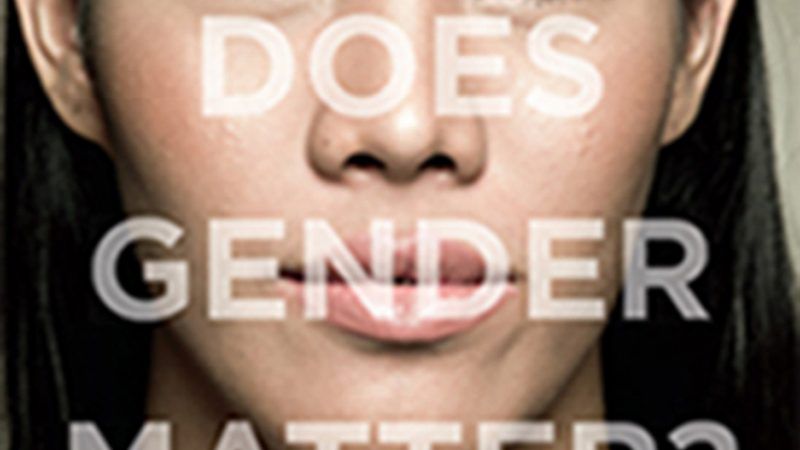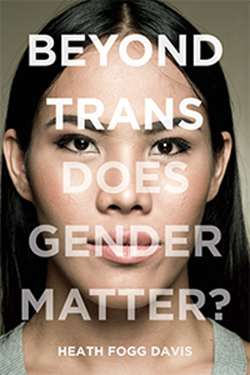The Case for Gender Anarchy
Want to end trans discrimination? Stop forcing people to label themselves.

Beyond Trans: Does Gender Matter?, by Heath Fogg Davis, New York University Press, 208 pages, $25

Philadelphia used to require every public transit pass to say whether a rider was female or male. For Charlene Arcila, a transgender woman, it didn't matter which option she chose; either way, some bus drivers deemed her pass illegitimate. Left to decide on the spot whether Arcila qualified as a man or woman, individual city workers would come to different conclusions—but every one of them had the power to refuse to let her ride the bus.
Instituted in the 1980s as a protection against fraud, Philadelphia's sex-identifying transit cards didn't cause trouble just for transgender passengers. Plenty of cisgender folks—those whose gender identity conforms to the norm for their biological sex—fail to present as obviously male or female, and passengers of androgynous or ambiguous gender expression also found themselves at the mercy of the public transit sex police.
Following a lawsuit from Arcila and an outcry from local activists, Philadelphia removed sex identification from its transit passes in 2013. Harper Jean Tobin, policy chief for the National Center for Transgender Equality, followed this victory by pushing for mechanisms to make it easier for transgender Americans to change their sex identification on government documents. It's a popular idea in the modern feminist and LGBT movements. But for Heath Fogg Davis, a transgender man who teaches political science at Temple University, the strategy reflects a deficit in the way many activists think about gender liberation.
Instead of making it easier for individuals to move between two binary positions, Davis writes in his new book Beyond Trans, they should be "questioning our need for sex-classification policies" in the first place. What had made the Philadelphia case "so radical and important," he argues, "was the use of antidiscrimination law to challenge the need for bureaucratic sex classification itself." Beyond Trans is his comprehensive case that everyone—not just transgender people—"would be better off in a society with dramatically fewer sex-classification policies."
To be clear on terms, sex refers to your biological status as male, female, or intersex; it's the category that's determined by chromosomes and hormones. Gender incorporates the external fixings we attach to these biological categories—the bits governing our social expectations for how a man or woman should dress, look, talk, think, and act. Sex says men on average have lower levels of good cholesterol than women do; gender says they should be good at working with their hands and hate romantic comedies.
Transgender people are those whose gender identity and expression—whether they feel like a man or woman and whether they look like one—are at odds with what we normally attach to their biological sex. The term does not necessarily imply that someone has been through what was once called a "sex change operation" and is now referred to as gender "reassignment" or "confirmation" surgery. (According to the Human Rights Campaign, only about a third of all transgender people have undergone any such procedures.)
An array of other terms—the most prevalent probably being non-binary, genderqueer, and agender—are being adopted by people who do not necessarily identify as either male or female. Unlike their transgender counterparts, nonbinary individuals seek to remove themselves from the gender category they were assigned at birth without adopting the opposite.
So far, most moves to accommodate non-binary folks on official documents have involved adding a third category, such as X or NB, to sex- or gender-identification options. But Davis discourages this solution, as it "neither dismantles nor significantly challenges the bureaucratic use of the traditional sex binary."
"Even efforts to extend government sex classification policies to include people who reject the binary terms 'man' or 'woman' end up reinforcing the sex binary by leaving it intact," he writes. "These policies create exceptional categories."
Davis doesn't think the current ideology and activism around transgender rights are radical enough. They're driven by assimilation, not gender anarchy, and "fueled by the notion of correction"—the idea that trans men and women (and to a lesser extent the nonbinary) have simply had their true genders misidentified and will find liberation by fixing this mistake.
But while "correction" can make life better for individual trans people, it does nothing to address the underlying stigma we put on those who transgress sex boundaries and gender norms, and it does nothing to diminish the collectivizing hold that gender has on all of our lives. After all, it's not just transgender or genderqueer folks who are affected by what Davis calls sex-identity discrimination. A trans man who "passes" may experience very little hostility or discrimination in public, while a cis woman with a flat chest and masculine clothes may get a lot of it. Stopping prejudice and violence spurred by perceived transgressions of gender norms is crucially important for transgender people, but it's also bigger than this population.
"'Correction' does not solve the problem that sex-classification policies cause," Davis suggests. "As long as sex-classification policies remain in place, they will always trigger discrimination," because they will always require public employees to make subjective judgments about who does and does not belong in each category. A trans woman may successfully get her ID documents changed, but that's not necessarily going to stop an airport security agent who doesn't think she looks womanly enough from second-guessing her passport, and the same goes for some masculine-looking cisgender women. "Not everyone can or wants to assimilate into prevailing gender norms," Davis notes. "Moreover, some people's statements about their sex identities"—like Charlene Arcila's—"will be rejected no matter what they do or say."
"As a 'tomboy' who preferred and was allowed by my parents to wear boy's clothing, and keep a short haircut, I was routinely questioned and reprimanded by girls and women for being in the 'wrong' public bathroom," Davis writes. "Yet, I did not feel entitled to use a male-designated restroom."
Rather than trying "to assimilate and accommodate transgender individuals into existing sex-classification policies," he asks, "why not tackle the genesis of 'transgender discrimination'—sex-classification, itself?"
What would that mean in practice? Davis suggests that organizations of all kinds should scrutinize whether sex classification in any given arena is rationally related to a legitimate policy goal. Much of Beyond Trans involves the author applying this test to various avenues of sex classification and segregation, from birth certificates and driver's licenses to public bathrooms, sports teams, single-sex colleges, corporate affirmative action policies, the U.S. census, military drafts, and more. For instance, with Philadelphia's sex-marked transit passes, the stated goal—fraud prevention—is certainly a legitimate concern. "But the male or female stickers were not rationally related to that goal because females could share their passes with other females, and males could share their passes with other males."
Overall, Davis wants to remove sex- or gender-identifying markers from virtually all government-issued IDs and documents. This step "would help to bring about substantial cultural reform, as it would send a strong message to all of us that a person's sex classification is irrelevant to most public transactions."
Davis does not call himself a libertarian, but there is much to like here for anyone interested in privacy, individualism, and striking a blow against needless bureaucracy. The mainstream trans rights movement has been focused on helping trans and nonbinary people live with minimal hassle as their preferred gender (or lack thereof). Davis wants something bigger: to break down bureaucratic binaries for everyone.
This willingness to look at the big picture—and to look beyond big government—makes Beyond Trans refreshing. Davis situates the struggle for transgender dignity and rights squarely within a larger framework of personal freedom and privacy concerns, and shows how removing institutional barriers to living beyond the gender binary can help everyone live fuller, freer lives.
This article originally appeared in print under the headline "The Case for Gender Anarchy."


Show Comments (302)